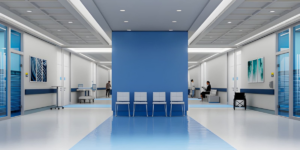Choosing a medical school in St. Kitts can be a worthwhile option to choose accredited and globally recognized MD programs and become a practicing physician. From US clinical rotations to successful USMLE preparation and excellent residency placements, St. Kitts medical schools offer a cost-effective education with affordable tuition fees and living expenses without compromising medical education quality. The beautiful, tropical location promotes a balanced life and flexible admission requirements, making medical education more accessible for every member.
St. Kitts has gradually become a valuable hub for quality medical education. You will find several Caribbean medical schools that exclusively cater to international medical students. Windsor University School of Medicine is one of the top medical schools in St. Kitts, attracting aspiring physicians from the U.S., Canada, and all over the globe. WUSOM offers accredited MD programs, U.S.-based clinical rotations, and the allure of tropical island life.
Suppose you want to study medicine abroad and have the passion and capability to become a competent physician, and are having difficulty getting accepted into a U.S. medical school. In that case, medical schools in St. Kitts, like WUSOM, can be a worthwhile option.
This blog will help you understand why you should choose medical schools in St. Kitts, and the pros and cons of pursuing an MD degree in the Caribbean.
Pros of Studying Medical Schools in St. Kitts
International Recognition
St. Kitts medical schools are accredited by international bodies like the CAAM-HP (Caribbean Accreditation Authority for Education in Medicine and Other Health Professions). This accreditation is crucial to prove that your MD degree meets the rigorous standards in the US, Canada, and other countries, enhancing your qualifications for licensure and residency. This global recognition ensures that the MD degree can lead to licensure in other countries.
An Easy Path to Becoming a Physician
Many capable students don’t match with U.S./Canadian MD schools the first time. Caribbean medical schools enroll many qualified applicants who weren’t admitted to U.S. or Canadian MD programs for reasons ranging from GPA/MCAT to admission timeline. Several St. Kitts medical schools follow a U.S.-style curriculum and offer clinical rotations in the U.S., U.K., and other regions. The school’s accreditation, a strong Step score, and clinical record make you the best candidate for the competitive residencies in the U.S. and UK.
Multiple Start Dates & Faster Timelines
One of the significant benefits of choosing a St. Kitts medical school is the flexibility in admissions. Unlike U.S. and Canadian medical schools that typically have a single yearly intake, WUSOM MD programs offer multiple start dates throughout the year. This rolling admissions system enables students to start their studies without waiting for the next annual cycle, saving them valuable time.
Additionally, some schools operate on a year-round schedule with shorter breaks, allowing students to complete their basic sciences more quickly and progress to clinical rotations sooner. This accelerated timeline can help motivated students enter residency training and start their medical careers earlier. WUSOM mainly focuses on your motivation, resilience, and recent academic trends more than a single MCAT/GPA snapshot. If you’re a late bloomer or rejected from a U.S. medical school, you can apply to WUSOM.
U.S.-Modeled Basic Sciences and Clinicals
Medical schools in St. Kitts follow a U.S.-based curriculum, which means the structure, teaching methods, and assessments are designed to prepare students for the United States Medical Licensing Examination (USMLE). The MD program is divided into two main phases: basic sciences, taught on the Caribbean Island, while clinical rotations are conducted at affiliated hospitals in the U.S. or other countries.
Courses are organized into organ-system blocks, utilize case-based learning, and integrate modern medical technology, similar to U.S. medical schools. This approach ensures that students not only gain a strong foundation in medical knowledge but also align their training with the standards expected of physicians practicing in the U.S. and beyond.
Broad Patient Exposure
Medical schools in St. Kitts provide students with the opportunity to gain broad patient exposure, particularly during their clinical years. Through partnerships with hospitals in the U.S., U.K., and other regions, students encounter a diverse range of patients, medical conditions, and healthcare systems. This diversity allows you to develop strong diagnostic and clinical decision-making skills while adapting to different medical environments.
Such wide-ranging exposure not only enhances your clinical competence but also prepares you to work effectively in multicultural healthcare settings. This is an added advantage when applying for residency and practicing in global medical communities.
U.S. Residency Opportunities
Pursuing an MD degree from a medical school in St. Kitts can open the door to U.S. residency opportunities. Reputable St. Kitts schools like WUSOM have affiliations with U.S. teaching hospitals for clinical rotations, allowing you to gain practical experience and be eligible for U.S. medical residencies after graduation.
Many of these schools are structured to meet the requirements of the ECFMG, allowing graduates to sit for the USMLE exams and apply for residency programs in the United States. With strong exam performance, solid clinical evaluations, and relevant experience, graduates can successfully match into U.S. residencies, particularly in fields like internal medicine, family medicine, pediatrics, and psychiatry.
While competition is more intense compared to U.S. medical graduates, St. Kitts medical schools still provide a viable pathway for IMGs to secure training and begin practicing in the U.S. healthcare system.
Affordable Tuition & Scholarships
One of the most appealing aspects of medical schools in St. Kitts is their affordability compared to many U.S. and Canadian medical schools. Tuition fees are generally lower, and many Caribbean medical schools offer merit-based or need-based scholarships to ease the financial burden.
WUSOM offers scholarships to reduce financial burdens and enhance affordability, allowing students to focus more on their studies and less on overwhelming debt. This makes pursuing a medical degree more accessible for students who may find the cost of U.S. medical education prohibitive. Affordable tuition fees, combined with the possibility of financial aid, make St. Kitts an attractive option for those seeking a quality medical education at a more manageable cost.
Personalized Education
One of the key benefits of studying at a St. Kitts medical school is the personalized education it offers. With smaller class sizes and lower student-to-faculty ratios, students receive individualized attention from instructors, allowing for a deeper understanding of medical concepts and stronger academic support.
Study-Life Balance
The beautiful Caribbean island setting offers a unique environment for a study-life balance, allowing you to enjoy the climate, beaches, and various outdoor activities when you’re not in class. St. Kitts offers amenities similar to those in the U.S., including various housing options, supermarkets, restaurants, and public transportation, making it a comfortable place for international students to live.
Diverse Community
Another major benefit of studying at medical schools in St. Kitts is the diverse and multicultural student community. By interacting with peers from different cultural, social, and professional backgrounds, students develop a broader worldview and a deeper appreciation of global perspectives. This diversity not only enriches classroom discussions but also prepares future doctors to work with patients from varied cultural backgrounds.
Exposure to such diversity enhances communication skills, cultural sensitivity, and adaptability. All these qualities are crucial in today’s interconnected healthcare system, where physicians serve patients from all walks of life. Building international connections also opens doors to global opportunities, collaborations, and networks that can support a successful medical career.
Cons of Studying Medical Schools in St. Kitts
Limited Global Recognition
While some St. Kitts medical schools are accredited, not all are widely recognized worldwide. Graduates may face restrictions or additional requirements when applying for residency or practicing medicine in certain countries.
Accreditation, hospital affiliations, and graduate outcomes differ widely. If accreditation or approvals don’t align with your goals, you may face limits on exams, rotations, licensure, or visas. Policies evolve. You must verify current accreditation/approvals with official bodies, e.g., ECFMG, CAAM-HP, WFME, and state boards, before enrolling.
Residency Placement Challenges
International medical graduates (IMGs) do match every year, but residency match rates and medical specialty options are typically narrower than for U.S. MDs. Plan for a data-driven medical specialty strategy, like primary care, internal medicine, pediatrics, psychology, and family medicine, that are more attainable. Students need to work harder to stand out with strong academic performance, USMLE scores, and clinical experience.
High Tuition and Living Costs
One of the significant challenges international students face when studying at medical schools in St. Kitts is the financial burden. Tuition fees, housing, daily living expenses, exam costs, flights, and travel for clinical rotations can quickly add up over the course of a 4-year MD program.
Unlike U.S. medical schools, access to federal financial aid is more limited abroad. Therefore, students must build a detailed financial plan that accounts for tuition, housing, exam fees, travel expenses, and loan repayment scenarios before enrolling. The cost of international travel for holidays and U.S. rotations further adds to the overall expenses.
WUSOM provides scholarships, grants, and financial aid to ease the financial strain. However, students should carefully research each school’s financial aid offerings and evaluate long-term affordability before making a decision.
Adjustment to Island Life
While studying medicine in St. Kitts offers a beautiful Caribbean setting, adjusting to island life can be difficult for many international students. Additionally, being far from family, friends, and familiar support systems can exacerbate the emotional strain, especially during the demanding years of medical education. Homesickness and cultural adjustments can impact focus and well-being if students are not prepared for the change.
Although the island lifestyle can teach resilience and adaptability, which are the most valuable traits for a future physician, it remains a real challenge for some students who thrive in larger, more connected environments.
High Attrition Rates
One concern with some Caribbean medical schools, including those in St. Kitts, is their higher attrition rates compared to U.S. or Canadian medical schools. This can be discouraging for international medical students who invest a significant amount of time and money in their education.
While certain schools in St. Kitts maintain strong accreditation standards and demonstrate lower attrition rates, others don’t provide the same level of academic or support resources to help students succeed. It is essential for prospective students to carefully research each medical school before enrolling. It can help applicants choose a program where they have the best chance of completing their MD degree.
Bottom line
A St. Kitts medical school can be worth it for motivated applicants who verify accreditation and clinical infrastructure, accept a more competitive residency landscape, and are ready to excel on USMLEs and in rotations. It is not a shortcut; it’s a viable but demanding alternative pathway to becoming a physician.
Studying at a medical school in St. Kitts comes with both valuable opportunities and notable challenges. Smaller class sizes, diverse communities, and international exposure can provide students with a personalized and enriching educational experience in the field of medicine. At the same time, high costs, adjustment to island life, competitive residency placement, and varying school quality are factors that require careful consideration.
If you are committed to pursuing an MD degree abroad, apply to WUSOM and enroll in an accredited MD degree program.







